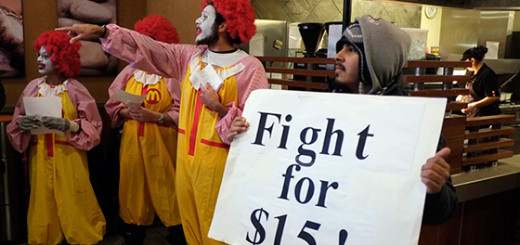Newspapers: You are selling trust. Forget that at your peril.

Click here to listen to the broadcast of You Tell Me on KTBB AM & FM, Friday, Jan. 14, 2011.
Newspapers fascinate me. I am in awe of the entire process of composing, producing and delivering a unique publication every single day of the year.
Newspaper publishers not only operate white-collar content creation operations, they also operate blue-collar manufacturing plants that turn literally tons of raw material into a unique product that is widely delivered every morning.
The daily cycle of gathering, writing, editing, composing, producing and delivering tens of thousands or hundreds of thousands of copies of an all-new publication on a daily basis is relentless. The fact that the newspaper arrives in your front lawn each morning with such regularity that you can take it for granted is amazing.
Every radio station in America competes for advertising revenue with the local newspaper. In addition to that revenue competition, those of us that own or run news and talk radio stations compete with the paper for audience and community standing.
Despite that competition for eyes, ears and dollars, I would never wish for newspapers to disappear. Newspapers at their best constitute a publication of record for the events, politics, policy and opinion germane to their respective communities. A sober, competent, ethical practitioner of such journalism is something every community needs.
But disappearance, once unthinkable, is now possible. Blame a lot of factors but none more than the Internet. The newspaper industry’s economic model has been shattered.
Put very simply, at one time circulation revenue, what you paid for the paper, covered the cost of production. Display advertising, the ads for Macy’s and Sears and J.C. Penney, paid for the news and editorial staff and the classified section, the want ads and you selling your bass boat, provided the profit.
Today, circulation (of the ink-on-paper edition) is down, in some cases precipitously, display advertising is down and the classified section has all but disappeared. Layer a weak economy upon this scenario and you find the newspaper industry in a real struggle.
Every newspaper now has an online edition, many of which are excellent, but the ads you see there don’t come close to replacing the revenue lost from the three traditional sources.
With an eye toward repairing their business models, newspapers are exploring charging for online content. The Dallas Morning News is the latest to make such an announcement. Success is by no means assured but I’m pulling for them. If the Tyler Paper ever makes a similar proposal, I will support it.
But I offer this caution to the newspaper industry at large (and much more so than to the Tyler Paper in particular):
Implicit in the title ‘publication of record’ is a trust, of which many newspapers, The New York Times being the highest-profile example, have lately been poor stewards.
Every journalism student learns the five Ws; who, what, where, when and why. On any given story, the first four Ws will usually emerge pretty quickly. It’s the fifth W, the why, that can be slow to become clear, if it ever becomes clear at all.
Yet it was the Times’s Paul Krugmann, a newspaperman who should certainly know better, that went straight to the “why” within minutes of the Tucson shooting despite having not the tiniest fragment of supporting evidence for his position. In so doing, he forfeited more of the Times’s dwindling reservoir of credibility. The fact that Krugmann appears on the editorial page and not the front page is no excuse.
In the heyday of newspapers, legend has it that a sign hung in the City News Bureau of Chicago that said, “If your mother tells you she loves you, check it out.”
That means that the reporter writing the front page story has to find out if his mother really does love him before he puts it in the record. And it means that Paul Krugmann must similarly test his mother’s assertion before he can credibly opine on maternal love.
Newspapers are businesses and they are governed by a simple truth. If your customers don’t trust you, they won’t buy your product.
Forfeit that trust, as too many newspapers again did in the wake of the shootings in Tucson, and no business model that anyone can devise will save you.
And I would mourn your passing.








As wrong as he is, the fact that Krugmann appears in the editorial page does give him license to do so. It’s his opinion and it’s an editorial.
I was privilaged to grow up with two Uncles who were reporters. One for the Stars and Stripes the other for various News Papers and Radio Stations in around Galveston/Houston. One went on to become news director for CNN, many years ago.
I was always in awe of these men…my father walked out when I was young and these two men helped me form my values and free thinking and outspoken manner of today.
The point to this is really simple; reporting the news was a major responsablility and something that a person could be proud of. Key word…WAS…I am sorry to say.
I find far too many reporters and news agencies, have forgotten the sacred trust placed in them. Jumping off on personal agendas rather than “reporting the news” and insuring that the “sacred trust” of truth is maintained.
It breaks my heart to see the newspapers fail, time and time again, to hold the standard of truth above partisan politics or allowing theselves to become the mouth piece for Government.
It is a sad state of affairs when they forget their duty. But, they pay for it in the long run through lost readership, lost advertising and loss of honor.
Rick Armstrong
Tyler, Texas
As you said, newspapers are a business and Krugmann is catering to his paper’s base, the left leaning crowd. It’s good, smart, business.
I grew up in Arkansas where we had two papers there in Little Rock. The Arkansas Gazette and the democrat paper. In my family, we preferred the Gazette, which was the oldest paper in Arkansas by the way. My Grandmother taught me to read before I started school by reading to me from the newspaper. I always loved reading the paper because back in the day, journalists were more accurate in their reporting…more facts than opinion. I have watched the downward spiral of the newspaper industry with a sadness that young people today will never know. There is nothing like waiting for the paper to be delivered each morning and opening it up to read…something tangible, something real, unlike the internet. But the decline can not be all because of the internet, no, sadly it has a lot to do with the tone written in those lines. It has become a part of the political wars and no matter how hard they try to disguise political bias, it is there! The Tyler paper used to be a paper like the Arkansas Gazette was when I was growing up, but sadly it has succumbed to the political pressures of today just to keep it afloat. But it may actually be it’s demise just like the Arkansas Gazette.
Linda Montrose said
“There is nothing like waiting for the paper to be delivered each morning and opening it up to read…something tangible, something real, unlike the internet”
Then why are you on this forum, it is obviously not real???
I can’t resist adding my two cents worth to this subject.
Paul said: “Forfeit that trust, as too many newspapers again did in the wake of the shootings in Tucson, and no business model that anyone can devise will save you.”
Thank you, Paul, for your emphasis on “trust”. However, I don’t mourn their passing any more than I would mourn the bankruptcy of an auto repair shop that overcharged and did shoddy and unnecessary work.
The best thing about the demise of the national, left-wing media is that the American people have not been fooled by their endless propaganda after all these years. My fellow Americans still remain wise and discerning of the truth as they seek information from sources that are objective and honest about their point of view.
God forbid that the pollution of “free speech” regulations by illegitimate government power should ever interfere with our fundamental right to seek the truth and support those respected sources as we see fit!
Thankfully, not only does our vote still count, but our participation in the “free market” of information can drive these propaganda machines (posing as news sources) out of business, also.
Paul,
Are the former category groups you have indexed in the past going to be available for search purposes in the Archives?
The categories were getting out of hand and were converted to tags – long story short … yes, the search function should be receptive to the old category names. If you find this to not be the case let us know. Thanks!
Extremely interesting blog post. Your post is very interesting. I enjoyed this post. This post is excellent! I have to say that after continually reading bad as in, same old ideas, little quality content, etc. blog posts on other sites, it’s nice to actually read something that has some thought put into it. It’s a pleasure to read quality blog posts, especially after continually seeing rehashed crap that writers and bloggers are throwing out nowadays. It’s always nice when I come across content that actually has value, I’ve been seeing a ton of subpar writing attempts lately. Anyways, thanks again and I’ll check back regularly to see what else you have to offer. I’ll check back in the future to see what else you have up your sleeve. Keep up the great work! BTW, I like your site design, but your header image was only loading half way for me. P.S. Your header is messed up a bit in IE. The problem could be on my end but I thought you might want to look into that.